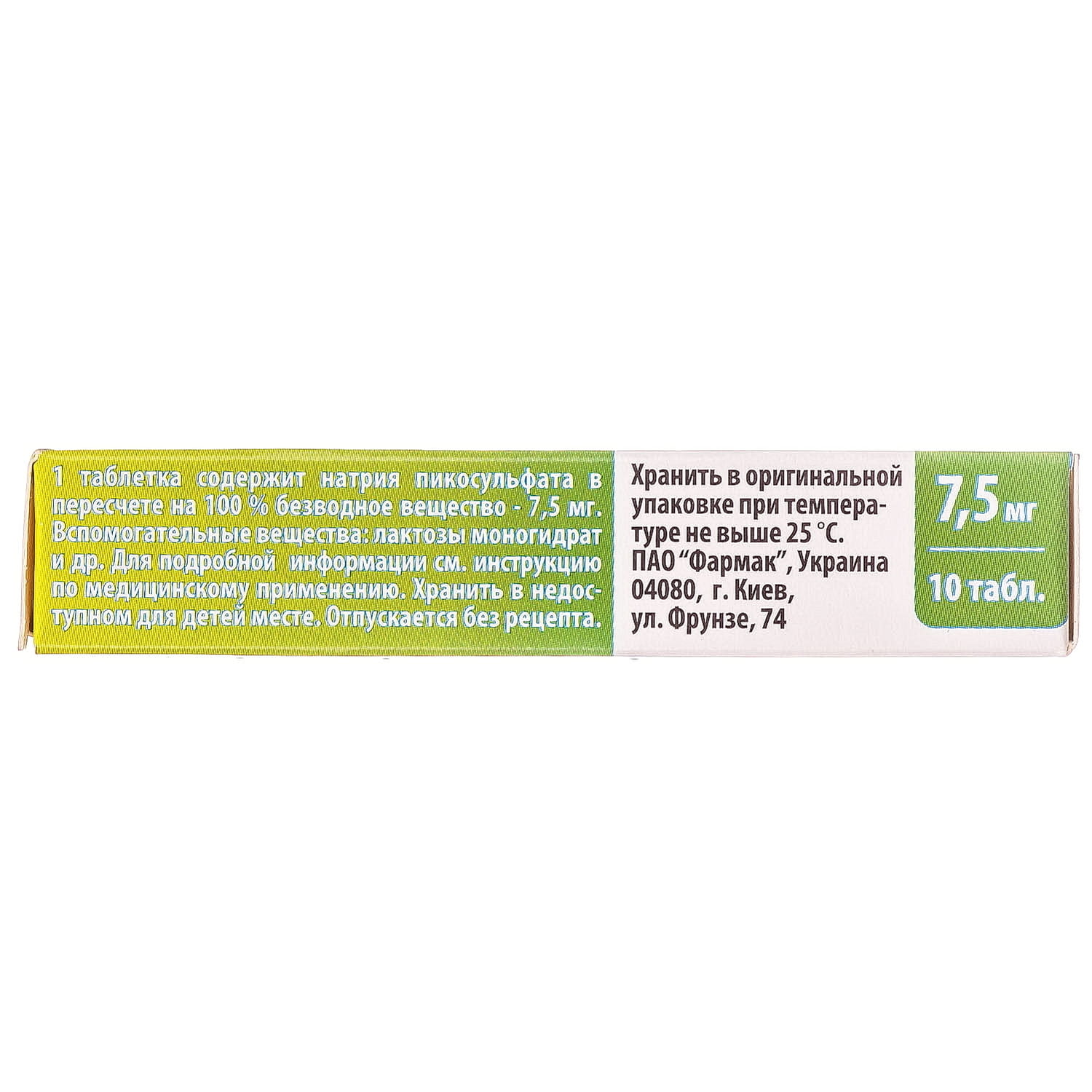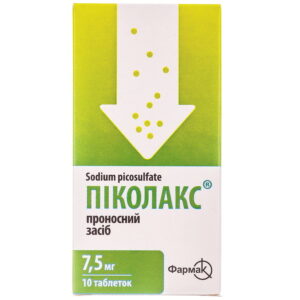Picolax tablets of 7.5 mg, blister of 10 pcs
Share:
Free Worldwide Shipping
$15.69 Original price was: $15.69.$14.29Current price is: $14.29.
Picolax tablets are a powerful laxative designed to provide effective relief from constipation and facilitate bowel cleansing before medical procedures such as colonoscopies. Each tablet contains 7.5 mg of the active ingredient, sodium picosulfate, which acts as a stimulant laxative to promote regular bowel movements by increasing the activity of the intestines. The tablets work by softening stool and stimulating the natural contractions of the bowel, ensuring a gentle yet effective passage. With a blister pack of 10 tablets, Picolax offers a convenient dosage for users seeking quick relief from occasional constipation or preparation for medical examinations.
Hotline Order:
+38 (050) 50 73 903
Email ID:
uapothecary.pharmacy@gmail.com
Pharmacological properties
Pharmacodynamics. sodium picosulfate, the active substance of the drug Picolax, is a local laxative of the triarylmethane group. sodium picosulfate after bacterial digestion in the colon stimulates its mucous membrane, accelerating peristalsis, promotes the accumulation of water and electrolytes in the lumen of the colon. the result is stimulation of defecation, reduction of transit time and softening of feces.
Pharmacokinetics. After oral administration of sodium picosulfate reaches the large intestine without significant absorption. The active metabolite bis-(p-hydroxyphenyl)-pyridyl-2-methane is formed after bacterial cleavage in the colon, the onset of action of Picolax usually occurs 6-12 hours after taking the drug, depending on the release of the active metabolite. After oral administration, a small amount of the drug can be detected in the organs and systems of the body.
The laxative effect of the drug does not correlate with the level of the active metabolite in blood plasma.
Indication
Constipation or conditions that require relief of defecation.
Application
pills
It is prescribed internally, preferably at night.
Adults and children over 10 years of age are prescribed 5-10 mg once a day. With severe and persistent constipation, adults are recommended to take 15 mg at a time.
Children aged 4-10 years – 2.5-5 mg once a day.
A single dose of the drug is effective for children. If necessary, the child’s treatment course can be extended, but it is preferable to limit it to 3 days.
The duration of treatment is set individually and usually should not exceed 10 days.
drops
The drug is dosed using the manufacturer’s dispenser. Adults: 13-27 drops (5-10 mg of sodium picosulfate); children from 4 years old (only by doctor’s prescription) – 7-13 drops (2.5-5 mg of sodium picosulfate). Picolax must be taken at night. After using Picolax, bowel emptying occurs after 10-12 hours. The drug can be used both with and without liquid. Picolax should not be used daily or for long periods without determining the cause of the constipation.
Contraindication
Increased sensitivity to the components of the drug; intestinal obstruction; acute inflammatory bowel diseases and acute abdominal diseases (including acute appendicitis, non-specific ulcerative colitis, peritonitis); abdominal pain, nausea and vomiting of unknown origin; severe dehydration.
In the case of rare hereditary conditions, as a result of which hypersensitivity to the excipients of the drug is possible (see. Features of use), taking the drug is contraindicated.
Picolax tablets – the condition after surgery on the gastrointestinal tract.
Side effects
With short-term use of the drug, side effects rarely occur. with long-term use of the drug in significantly increased doses, violations are possible:
on the part of the skin: skin rashes, urticaria, itching;
from the side of water-electrolyte balance: loss of potassium, sodium and other electrolytes, possible development of dehydration;
on the part of the digestive system: rarely – dyspeptic phenomena, nausea, vomiting, spasms and abdominal pain, diarrhea, flatulence, pain in the stomach and anus, increased intestinal motility, which passes when the dose of the drug is reduced;
from the side of the immune system: allergic reactions, angioedema;
from the side of the central nervous system: very rarely – headache, increased fatigue, drowsiness, convulsions, dizziness, fainting.
Special instructions
Picolax tablets
Use with caution in hypokalemia, increased magnesium content in the blood, patients with a weakened body.
The drug contains lactose, which should be taken into account by patients with hereditary lactose intolerance.
Use during pregnancy and breastfeeding. Long-term experience has not revealed any unwanted or harmful side effects of Picolax when taken during pregnancy.
There is no evidence of the penetration of Picolax into breast milk.
Despite this, Picolax can be used during pregnancy or breastfeeding, only if, in the opinion of the doctor, the benefit of using the drug exceeds the potential risk to the fetus / child.
Use with extreme caution if there is a threat of termination of pregnancy.
The ability to influence the speed of reaction when driving a motor vehicle or working with other mechanisms. Patients should keep in mind that due to the possibility of vasovagal reactions (spasms in the abdomen), dizziness and / or fainting, it is necessary to avoid potentially dangerous activities, such as driving a motor vehicle or working with other mechanisms.
Children. Do not use the drug in children without consulting a doctor. Do not use 7.5 mg tablets in children under 10 years of age. Do not use 5 mg tablets in children under 4 years of age.
Picolax drops
Patients with chronic constipation should undergo a full diagnosis and establish the cause of constipation.
Long-term use of the drug can lead to a violation of the water and electrolyte balance and hypokalemia.
Cases of dizziness and/or fainting have been reported that coincided with the use of sodium picosulfate. The available information allows us to assume that these phenomena correspond to fainting (associated with Valsalva failure) during the act of defecation, or are related to the vasovagal response to abdominal pain.
Patients with rare hereditary problems of fructose intolerance should not take this medicine because it contains sorbitol.
This medicinal product contains less than 1 mmol of sodium in 1 dose, i.e. it is practically sodium-free.
Use during pregnancy and breastfeeding. There are no adequate studies on the use of sodium picosulfate in pregnant women. For safety reasons, if possible, Picolax should not be used during pregnancy.
Clinical data show that neither the active metabolite bis-(p-hydroxyphenyl)-pyridyl-2-methane nor its glucuronides penetrate into breast milk. Thus, Picolax can be used during breastfeeding.
Studies on the assessment of the effect on fertility have not been conducted.
The ability to influence the speed of reaction when driving a motor vehicle or working with other mechanisms. Studies of the effect on the ability to drive vehicles and work with other mechanisms have not been conducted. However, patients should be warned about the possibility of developing side effects such as dizziness and/or syncope due to vasovagal reactions (especially abdominal spasm). In the event of an abdominal spasm, the patient should avoid such potentially dangerous activities as driving a motor vehicle or working with other mechanisms.
Children. The drug should be used in children aged 4 years and older only as prescribed by a doctor.
Interactions
Electrolyte imbalance can lead to reduced tolerance to cardiac glycosides. diuretics or corticosteroids may increase the hypokalemia caused by the use of Picolax in high doses. simultaneous treatment with antibiotics can reduce the laxative effect of the drug.
Overdose
Symptoms: taking Picolax in high doses can cause diarrhea, intestinal colic and clinically significant disturbances in the water-electrolyte balance (hypokalemia, loss of other electrolytes and fluids). there are reports of ischemia of the mucous membrane of the large intestine when using Picolax in higher doses, much higher than those recommended for constipation. long-term overdose leads to the development of chronic diarrhea and abdominal pain, hypokalemia, secondary hyperaldosteronism, possible kidney damage and the development of nephrolithiasis, metabolic alkalosis, and muscle weakness as a result of hypokalemia.
Treatment. Cancellation of the drug, induction of vomiting, gastric lavage, administration of enterosorbents (activated charcoal), symptomatic treatment (correction of water and electrolyte balance, especially in elderly patients and children, use of antispasmodics).
Storage conditions
Tablets. in a place protected from light at a temperature not higher than 25 °C.
Drops. In the original packaging at a temperature not higher than 25 °C.
Related products
Enterogermina c...
- Home
- Categories
- Allergy
- Antimicrobials
- Antitumor
- Cold & Flu
- Dental and Oral Care
- Dermatology
- Diabetes
- Eye & Ear
- First Aid
- Gastrointestinal tract & Liver
- Genitourinary System
- Heart & blood vessels
- Hematopoiesis & blood
- Hemorrhoids
- Herbs & Tea
- Homeopathy
- Immunity
- Medicines against parasites
- Medicines for children
- Musculoskeletal system
- Nervous system
- Solutions & diagnostics
- Pain Relief
- Vitamins & Supplements
- Product Catalog
- Shop
- Blog
- About Us
- Contacts












Reviews
There are no reviews yet.